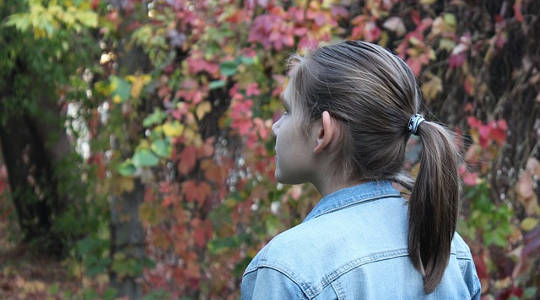
I never expected life to be so messy. If a palm reader had studied my hand while I was growing up and told me that, along with becoming a doctor and a television correspondent. I'd be married three times, go broke once, start my life over alone with two children in a brand-new city at the age of thirty-six, and, finally end up personally happy in my forties as a wife and mother of three, I would have yanked my hand back and rolled my eyes. And asked for a refund.
But she would have been right, after all. Of course, I didn't know any palm readers in Fort Wayne, Indiana, where I grew up, amid miles of rolling hills and fertile farmland, dotted every now and then with a white farmhouse and a red barn. The housing developments and strip malls that have since gobbled up the farms weren't a part of life in America's heartland then, and every street and store had its own personality. Now, when I go back and the commuter plane circles the airport, I find myself pressing my face against the window, searching for the landmarks that tell me I'm home. Each time, I'm disappointed to see that more of them are gone. The child in me wants "home" to be the way it always was.
Fort Wayne wasn't a place I ever remember planning on leaving, not consciously at least. Actually, I'm not really sure I "planned" anything all that far into the future. I simply assumed that my life would be just like my parents' life and the progression of my childhood: neat and orderly. Life in Fort Wayne was solid, and it still is. My best friends from my childhood and my adolescence still live there, as do my parents. All these years later, I'm still close to Mike, my best friend in high school, and, over the course of visits, his kids and mine have become friends. I go back every year for the Fourth of July and the parade is just as I remember it.
I lived in the same house from the time I was one until I turned seventeen, in a neighborhood where no one had fences and kids ran from yard to yard, and everyone's mom knew you and your mom. I guess I was relatively privileged -- my dad was a doctor and belonged to the local country club -- but my family lived an unpretentious life, and I grew up feeling very much a part of the fabric of life in a small Midwestern city.
I live in San Francisco now, a beautiful and romantic city perched on a bay that looks just like the postcards hundreds of thousands of tourists send home every year. It is the city I moved to to rebuild my life and reinvent myself just over ten years ago, as a single mother of two. Much more than miles separates my children's hometown from the one I grew up in. The woman who is a mother and wife, doctor, and television correspondent isn't the same person as the girl who lived and dreamed about her future in Fort Wayne. But as much as the experiences of the roads I've traveled since leaving home have shaped me, Fort Wayne and what growing up there taught me are also a part of the fabric of my soul. Going back to Fort Wayne has always grounded me, and I've made it a point to make sure my children, who live a privileged life in a cosmopolitan city, understand my Indiana roots.
Even though much has changed in Fort Wayne since my girlhood, and my parents moved to a fancier, more modern house twenty years ago, the one-story ranch house I grew up in still stands among the same houses, still painted the same colors, in my old neighborhood. The fir tree I climbed both as a tomboy and, later, as a teenager desperate for space and a view of the world, still towers over the hill. Even so, I know exactly how long I've been gone and how many miles away I've traveled when I look at the tree my parents planted in the front yard when I was six. The once sunny lawn is now cast into shade by its leaves and branches, and my mother's carefully tended strawberry patch has long since been taken over by lawn.
A few years ago, I drove by the house, as I always do when I'm in Fort Wayne, but this time it had a "For Sale" sign out in front. For years, I fantasized about walking through the house again, just to relive some of my childhood memories and maybe even get in touch with my girlhood self who'd been so happy there. I called the real estate agent and, of course, he was happy to let me see it. I asked my mom if she wanted to come, but she thought it'd be too sad, something that puzzled me at the time but that doesn't any longer. Instead, I took my oldest daughter, Kate, eager to show her where my stories took place. I imagined myself giving her the tour: Here's the trellis to the roof my sister and I climbed when we hid from our brothers; this is the living room where your grandmother stopped the fight between your uncles when they were boys and broke her finger in the process; this was my room and it was painted white.
The rooms were smaller and the ceilings lower than I remembered, and the woods that separated the back yard from the highway were shorter and thinner than the childhood forest stored in my memory. But the warmth and love of the family I grew up in seemed, to me at least, still to be a part of the place, and walking through those rooms with Kate, her eyes animated, made my girlhood come alive for both of us.
For many years, I went back to Fort Wayne precisely because my life was so full of change and turmoil that the fantasy of being able to go back sustained me. The still point that my hometown represented, fixed in my stable childhood memories, was as comforting as a mouthful of chocolate. I don't go back as often as I used to now, simply because I no longer need to.
The life I imagined for myself, growing up in that house in my old neighborhood, was simpler and neater than the one I actually ended up living. Life was, I thought then, a straight, unobstructed road to the destinations I would choose, with pretty vistas and sunsets on the way. Guided by my parents' example, I believed that marriages always lasted and that even when parents fought, they always made up. I knew no one whose parents were divorced, and if there was a single lesson we were all meant to learn, it was the value of staying the course.
I had an amazingly uneventful, happy childhood. By the time I was in third grade, I knew I wanted to be a doctor. I went to high school where I wasn't the prettiest or the most popular but did just fine as the editor of the yearbook. I sailed on to college, where the road took one unexpected turn, and went right on to medical school where, in my last year, I married a young man I'd known since childhood. I was twenty-four and, while life hadn't left me completely unscathed, the road ahead still looked pretty straight and relatively uncomplicated.
My husband and I shared a common background and were each ambitious and eager; our parents had long known each other socially. It looked, from the outside at least, like a perfect match. He was a lawyer, I was a doctor, and it seemed the world was pretty much ours for the asking. I had chosen pediatrics for my residency, and the two of us moved to Pittsburgh to start our adult lives and begin the "happily ever after" part. I was proud I'd managed to grow up without ever making an important wrong turn or a major mistake.
The next few years would change all that. First, my marriage fell apart after just five years and then, I decided to leave pediatrics for a specialty in ear, nose, and throat surgery, something I saw as another public admission that I didn't know where I was going or what I was doing. I castigated myself for every false step I took. But looking back, those years mark the start of my real "growing up", the beginning of the long haul that would bring me to where I am today. Errors in judgment, wrong choices, and failures as well as successes and triumphs altered my vision of the road I was on and changed who I was.
Now, looking back, I see that the map of my life has all manner of turns and twists, potholes and mud, dead ends and -- now and again -- a sweep of open road. It is not the map I expected to end up looking at, growing up in Fort Wayne, Indiana, but it is mine. It is also a record of an uneven, sometimes circuitous journey that I share with many women, if not in the specific details, then in its broad outlines.
Take marriage, for example. In America today, almost one in two women will find themselves living lives and on a path very different from their girlhood dreams. Gather a group of women together and the statistical likelihood is that almost half of them have been divorced at least once. They find themselves not only trying to start their lives over but, often, raising children with little or no emotional or financial support. By contrast, in my mother's generation, a gathering of women for coffee and cake would have had nine married women for every divorcee. In my grandmother's lifetime, a woman would have been far more likely to be widowed than divorced.
It took me a very long time to stop apologizing to myself, to my parents, and to anyone who mattered about how uneven the roads I'd taken turned out to be.
I know better now.
Looking back at my life, I have taken a necessary journey that has made me a person of a richer fabric, if a bit ragged around the edges. I know now, as I didn't then, that the journey itself is every bit as important as where the road finally takes us. I guess that's why my childhood furniture still decorates the house I live in and why I still drive the same old car, the 1983 BMW that was, along with my oldest child and the clothes on my back, all I was able to retrieve from my second marriage. It is also the car I drove from Little Rock to San Francisco to start my life over. The 150,000 miles on its odometer are an important reminder of where I once found myself -- broke, the single mother of two, starting over and clueless about how to do it -- and where I am now.
In fact, I might not have been able to get where I am today if I hadn't gone to those other places first. And for that reason, I'm hanging on to that car for as long as I can. It is my own personal, self bestowed merit badge.
Telling our stories is important, and as I tell mine, both who I am and where I've been become clearer, more defined. I can look at the map in my mind's eye and I can see the intersections where my life took a new turn. I can point to the places where I changed, the events and people that taught me the meaning of joy, the junctures where I felt the full burden of despair. What's not visible when you're on the road is clearer in retrospect. I can now see that the roads I managed not to take were blessings, along with a few I probably should have taken after all. The map, like the journey of life it details, is still a work in progress, with plenty of intersections ahead.
When we look closely at the maps of our lives, we realize that each intersection is different. Some are roads we have chosen, deliberately or unthinkingly, and some are pathways others have chosen for us. Still others are detours or blind alleys. And then there are the intersections we can ascribe only to something larger than ourselves, a cosmic force we may call by one of many names. The important point is that each of these intersections has something to teach us, to inform our growth. Instead of beating ourselves up for what we did or didn't do, we need to try to see the journey we've taken as necessary, glean from it what value we can, and start scanning the horizon for new opportunities.
The necessary journeys I have taken have made me a stronger, more resilient, more confident woman than my young girl self, lying on her bed in that cozy house in Fort Wayne, ever dreamed of becoming. Of course, when young girls daydream about the future, they only dream of what they'll be, not who they'll be. It takes the journey to teach you that who you are is more important than anything else.
Excerpted by permission of Hyperion Books,
New York. ©2000. www.hyperionbooks.com
Article Source
 Necessary Journeys: Letting Ourselves Learn From Life
Necessary Journeys: Letting Ourselves Learn From Life
by Nancy L. Snyderman, M.D. and Peg Streep.
Info/Order this book.
About The Authors
Dr. Nancy L. Snyderman is a mother of three, a wife, and a surgeon who specializes in otolaryngology. She is a medical correspondent for ABC News, 20/20, and Good Morning America.
Peg Streep is the mother of a daughter and the author of Spiritual Gardening, among other books.
























